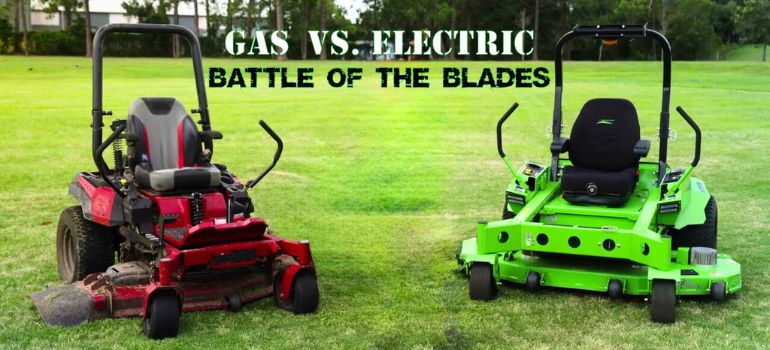Introduction
The choice between electric and gas-powered zero turn mowers can be overwhelming for homeowners. Each option has its set of advantages and drawbacks, making it crucial to understand their differences. In this article, we’ll explore the key factors to consider when choosing between electric and gas zero turn mowers.
Understanding Zero Turn Mowers
Before delving into the specifics, let’s briefly understand what zero turn mowers are. These machines are known for their exceptional maneuverability, allowing users to turn 360 degrees without leaving any uncut grass. They are widely used for their efficiency in covering large lawn areas quickly.
Advantages of Electric Zero Turn Mowers
Environmental Impact
Electric zero turn mowers are eco-friendly, producing zero emissions during operation. This makes them an ideal choice for environmentally conscious consumers looking to reduce their carbon footprint.
Low Maintenance
Compared to their gas counterparts, electric mowers require less maintenance. They have fewer moving parts, resulting in fewer opportunities for wear and tear.
Noise Levels
Electric mowers operate quietly, providing a more peaceful mowing experience. This is especially beneficial for those living in noise-sensitive neighborhoods.
Drawbacks of Electric Zero Turn Mowers
Limited Run Time
One of the primary drawbacks of electric mowers is their limited run time per charge. This may be a concern for users with large lawns, as they might need to recharge the mower before completing the job.
Initial Cost
While electric mowers boast lower operating costs, their initial purchase price is often higher than that of gas-powered models.
Advantages of Gas-Powered Zero Turn Mowers
Powerful Performance
Gas-powered zero turn mowers are known for their robust performance, making them suitable for tackling dense or overgrown grass.
Longer Run Time
Unlike electric mowers, gas models don’t require recharging, allowing users to mow for extended periods without interruptions.
Versatility
Gas-powered mowers are versatile and can handle a variety of terrains and grass types, making them suitable for a wide range of lawn conditions.
Drawbacks of Gas-Powered Zero Turn Mowers

Environmental Impact
Gas-powered mowers emit pollutants during operation, contributing to air pollution. This may be a concern for environmentally conscious users.
Higher Maintenance
Gas mowers generally require more maintenance due to their complex engines and additional components.
Comparing Performance
Speed and Maneuverability
Both electric and gas zero turn mowers offer impressive speed and maneuverability, allowing users to navigate around obstacles with ease.
Cutting Quality
The cutting quality of both types depends on factors such as blade sharpness, deck design, and mower speed. Users should prioritize regular maintenance to ensure optimal cutting performance.
Factors to Consider When Choosing
Lawn Size
For smaller lawns, electric mowers are often sufficient, while larger lawns may benefit from the extended run time of gas-powered models.
Budget
Consider your budget not only for the initial purchase but also for long-term operating costs, including fuel or electricity expenses.
Noise Tolerance
If noise is a concern, electric mowers provide a quieter solution, enhancing the overall mowing experience.
Environmental Concerns
If reducing your environmental impact is a priority, electric mowers are the more eco-friendly option.
Making the Decision: Electric or Gas?
Ultimately, the choice between electric and gas zero turn mowers depends on your specific needs and preferences. Consider the factors discussed above and weigh the advantages against the drawbacks to make an informed decision.
Real User Experiences
To provide a well-rounded view, let’s explore real user experiences with both electric and gas-powered zero turn mowers. Users often share insights into performance, ease of use, and overall satisfaction with their chosen mower.
Tips for Maintenance
Regardless of the type of mower chosen, regular maintenance is essential for optimal performance. This includes sharpening blades, cleaning the deck, and checking oil levels for gas-powered models.
Conclusion
In the electric vs. gas zero turn mower debate, there’s no one-size-fits-all answer. Each type has its strengths and weaknesses, and the best choice depends on your lawn size, budget, and environmental concerns. Assess your priorities and make an informed decision that aligns with your specific needs.
FAQs
1. Are electric zero turn mowers suitable for large lawns?
Yes, electric mowers can be suitable for large lawns, but users should consider the limited run time and plan for recharging if needed.
2. How often should I service my gas-powered zero turn mower?
Regular service intervals for gas mowers include oil changes, air filter replacements, and blade sharpening. Consult your mower’s manual for specific recommendations.
3. Can electric mowers handle thick grass?
Electric mowers can handle moderate to thick grass, but users may need to mow more frequently to prevent overloading the motor.
4. What safety precautions should I take with zero turn mowers?
Always wear appropriate safety gear, be mindful of your surroundings, and follow the manufacturer’s guidelines for safe operation.
5. Are there government incentives for using electric mowers?
Some regions offer incentives or rebates for using electric mowers as part of environmental conservation initiatives. Check with local authorities for potential benefits.
